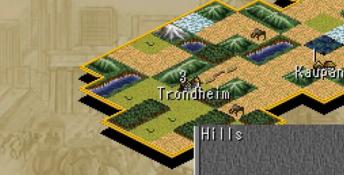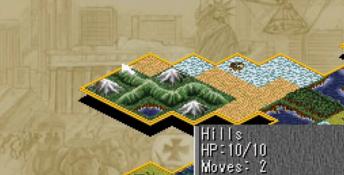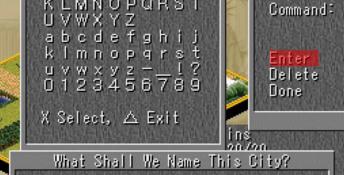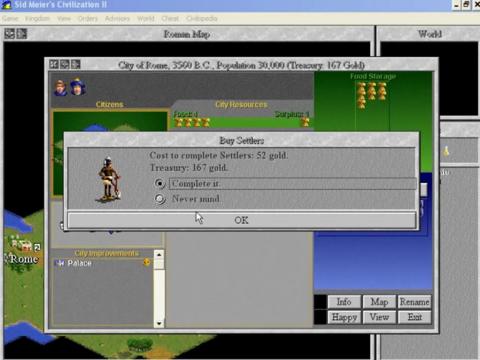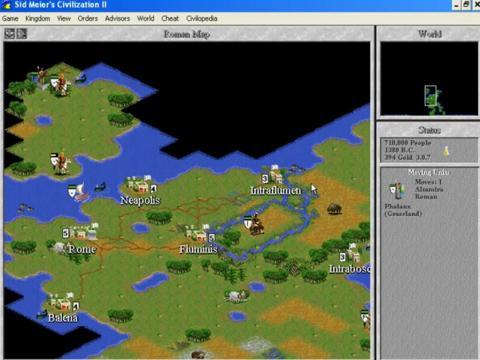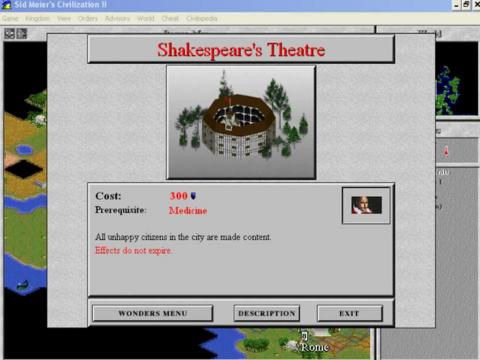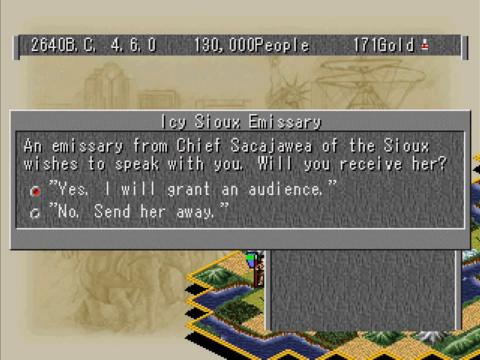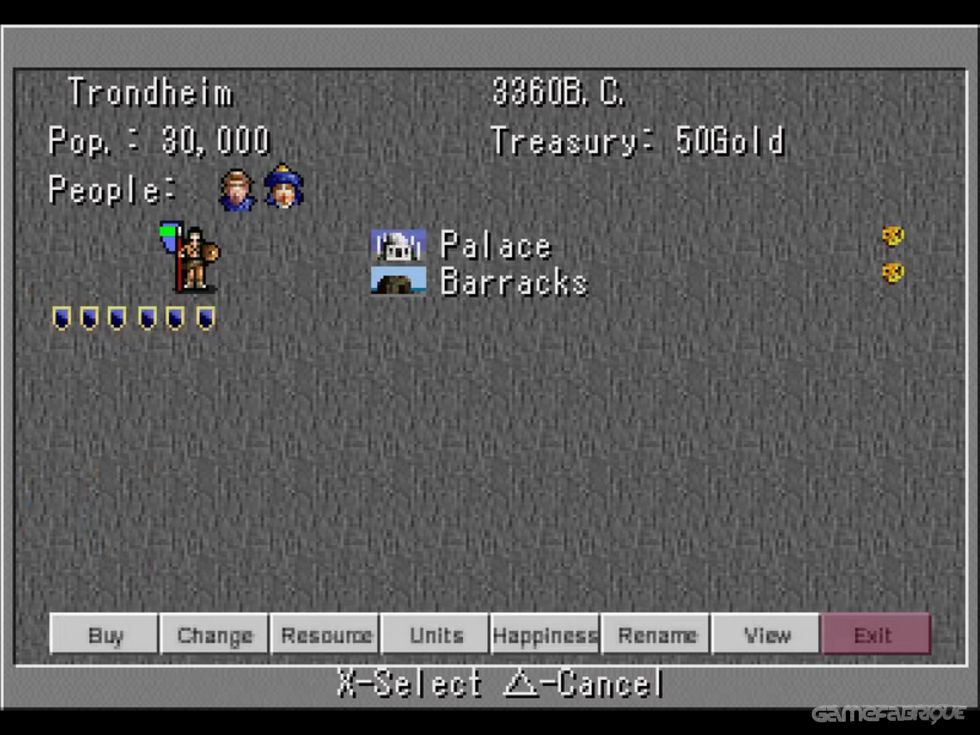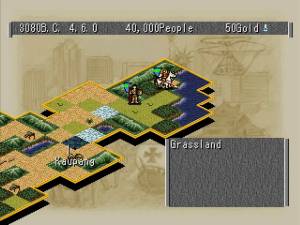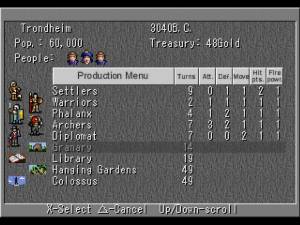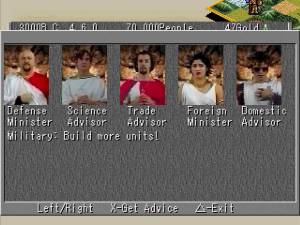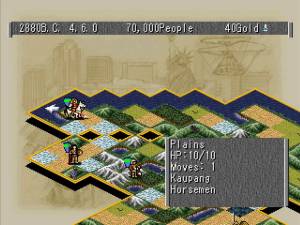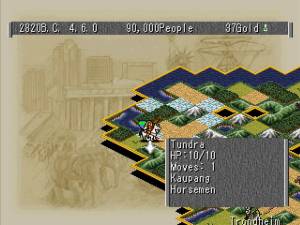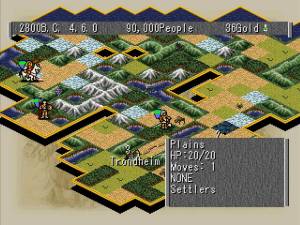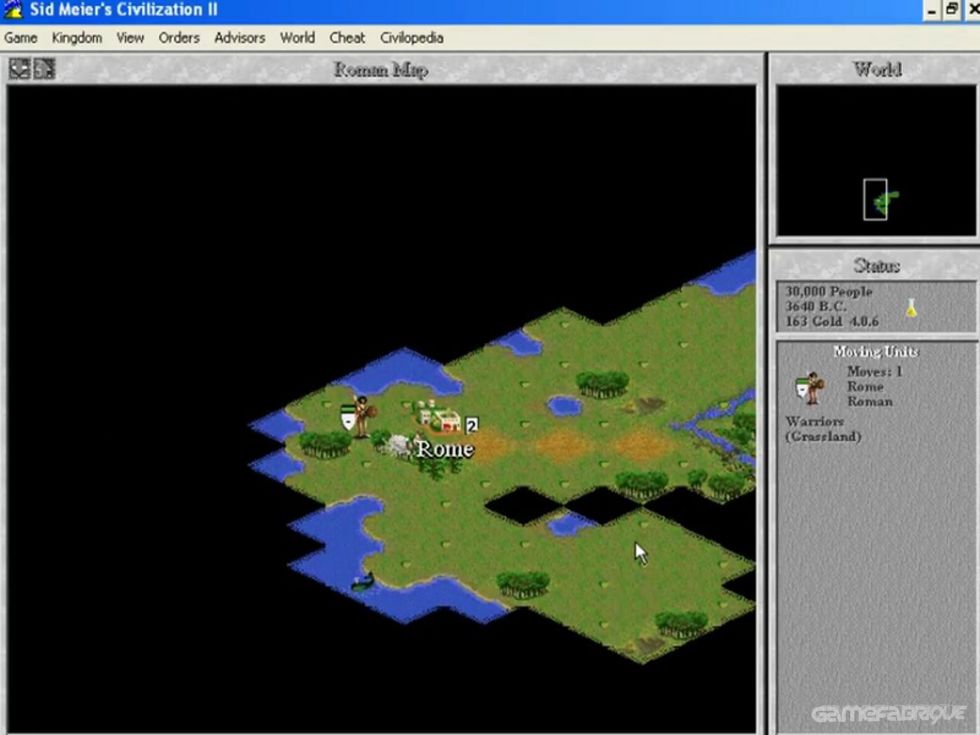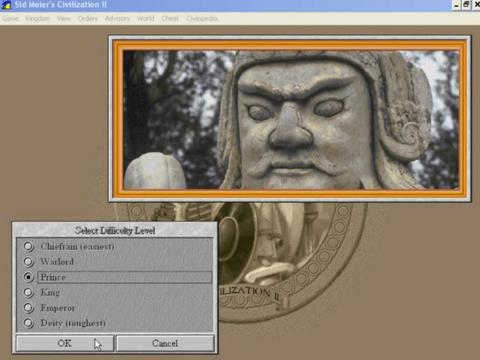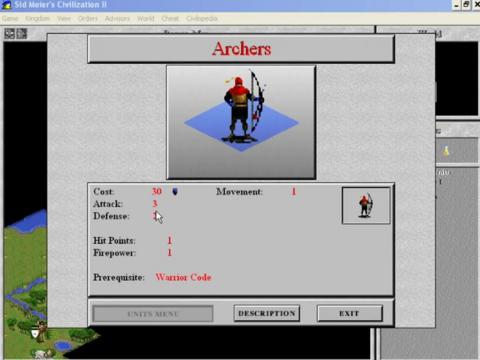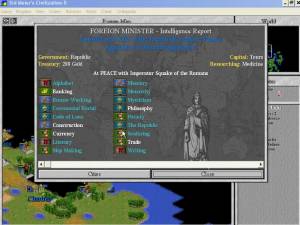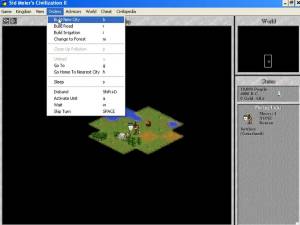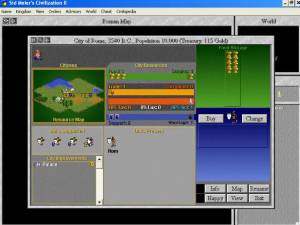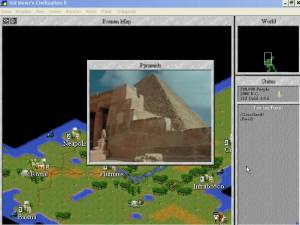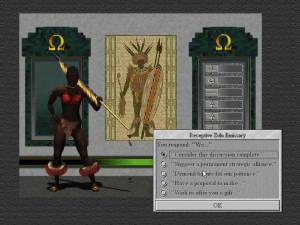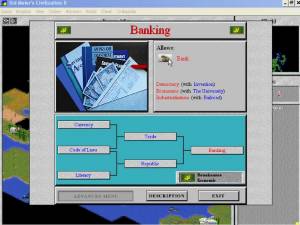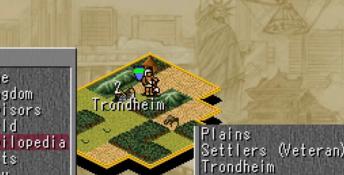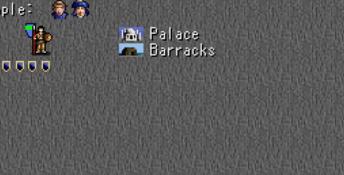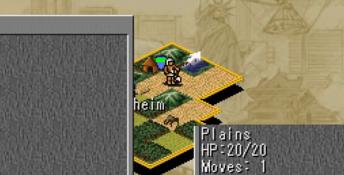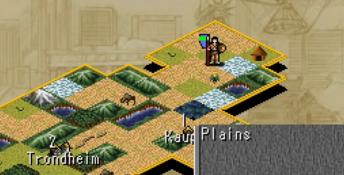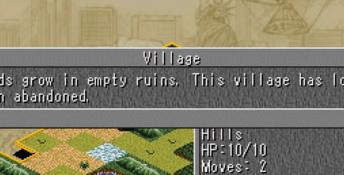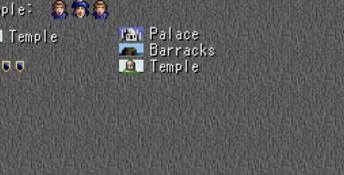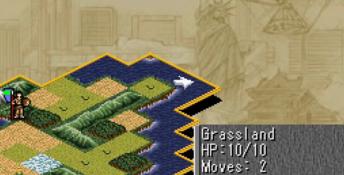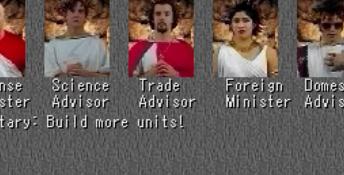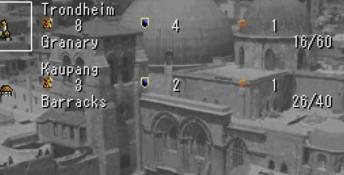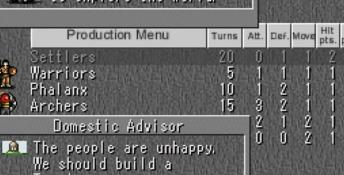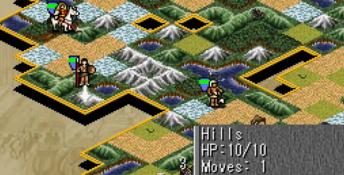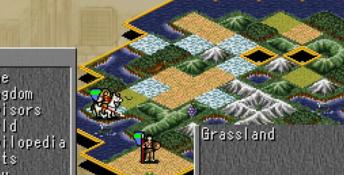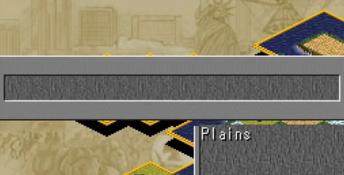Sid Meier's Civilization II
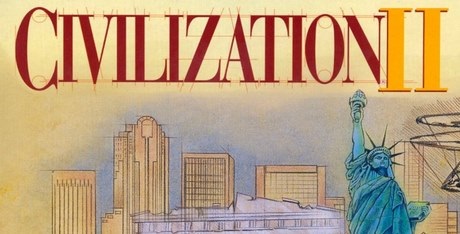
| a game by | Activision, and Microforum |
| Genre: | Strategy/War |
| Platforms: | PC, Playstation, PSX |
| Editor Rating: | 9/10, based on 5 reviews, 7 reviews are shown |
| User Rating: | 8.0/10 - 10 votes |
| Rate this game: | |
| See also: | Download Strategy Games, Retro Games, Civilization Games |
Civilization Must Rank As One Of the best games of all time - the strategy game to end all strategy games, I think someone called it when it first appeared. Luckily it wasn't, otherwise we would have missed out on playing all of those other top games -the entire Sim series, for instance, and all those lovely hexy wargames like Panzer General. But that's another story.
Until yesterday just three games in my sad, wizened little life had managed to keep me up past 4am: Dungeon Master on the Atari st (back when pc games were still a huge joke). Civilization and Doom. But now the total has gone up to four - Civilization 2 has just joined the others with a cracking up-till-five debut.
Die-hard Civ fans will be pleased to hear that Civilization 2 is basically an enhanced version of the first game. There's the same detailed gameplay and still endless opportunities for trying out different strategies. Combat has been tightened up and new units, advances and wonders introduced, so that players of the original will have plenty to learn. But the most obvious change is one of perspective - everything in the Civ world is now completely three-dimensional.
Perhaps the biggest disappointment is that network play won't be included; this is because MicroProse are about to launch Civnet, a network-play version of the original. However, whether a network-ready Civ 2 will appear is unclear at the moment. Anyway, on to the 3D perspective. After many hours of play I'm not totally convinced that it works, especially when you're in a complex situation with units all over the place.
It is surprisingly easy to mislay units, particularly if the terrain they're on is varied or forested and one or two of your units have previously been fortified. Towards the end of a hard game, I found myself wishing that I could switch back to the old 2D mode just to check that I'd done everything I could to prepare an attack. There's a neat (but rather slow) zoom option should you get bogged down, but it can be a nuisance when things start to get tense. And naturally enough, if you zoom in too close you won't see the full picture; zoom out too far and you get a green and blue blur.
The other improvement to the interface is the ability to open more than one window at a time. Although multiple windows can get in the way they're also handy, especially if you're fighting or developing things on two fronts.
Combat
Now whatever all of those peace-loving pacifists say, the world was undeniably built on blood and guts. I'm glad that so far it hasn't been my blood and guts, but you know what I mean. Sooner or later everything comes down to combat and somebody has to get blown away (or skewered or atomised, depending on the efficiency of the era). This is the basis of the world as we know it, Jim, and it's the only really tasty strategy in Civilization anyway. Everyone knows that there's no fun to be had learning your alphabet, so why pretend otherwise?
But I digress. Civilization 2 has a good number of enhanced combat rules, not least of which is the concept of hit points. Every unit has a certain number of hit points that represent the damage it can sustain before it's totally wiped out. For example, a unit with one hit point can take ten blasts before it becomes, well, an ex-unit, while the unit's firepower represents the amount of damage it causes each time it strikes the target.
The individual units have a shield next to them, representing the tribe (by colour) and relative strength (the strength bar along the top). When two units meet in combat, they slug it out until one or the other is finished off. The point to note is here is that this means you can win Pyrrhic victories -a win that leaves your triumphant unit as badly damaged as your vanquished opponents and generally means that your crew can be picked off by anything that happens to pass along. On the other hand, the new rules also have the effect of emphasising the difference between units at different technological levels by smoothing out the extremes of the probability table - no longer can a band of musketeers get lucky and destroy an armoured division, for example.
You can repair any damaged units by skipping one or more turns. It all takes less time if you're in a city, and should it happen to have special facilities such as say, ports, barracks or airports, the units can be 'healed' in one go.
And other combat factors have been updated, too. Chariots are weaker while legions are stronger, and musketeers and riflemen have improved defence values. Some units also have boosted firepower or defence in given circumstances, such as when partisans attack non-combat units or fighters attack helicopters. Shore bombardments have substantially reduced effectiveness.
More units
To go with the enhanced combat rules there are dozens of extra unit types. On land these include elephants, archers, pikemen, crusaders and fanatics; as you then go forward in time the list extends to dragoons and cavalry, to partisans, alpine troops (who have high movement capabilities), marines, paras and artillery. Incidentally, the previous artillery have now become howitzers.
In the air you can take your pick from stealth fighters and bombers, cruise missiles and helicopters; in the water there are galleons, destroyers and Aegis (anti-air) cruisers. And all of these are in addition to the units in the original game, so you have plenty of choice. If you've found your settlers a bit lazy, try out the engineers - they work twice as fast and can even transform terrain.
Oodles of city improvements have been added, from airports and antiaircraft missiles to sewers, supermarkets and superhighways. A dozen or more wonders of the world appear too - Sun Tzu's War Academy, Da Vinci's Workshop, King Richard's Crusade, Marco Polo's Embassy and the Statue of Liberty. The latter can be used to change government quickly, without the need for normal prerequisites. This becomes absolutely vital when you're a democracy with a heavy-handed senate breathing down your neck. I wonder if President Clinton was in on the development of this?
Some far-reaching changes have been made to the governments, and to the monarchy in particular. You can now support the first three units in each city without wasting shields, making monarchy much more desirable. And there's one new form of government: Fundamentalism. I'm afraid I don't know what it's like in real life, but in Civ 2 gameplay terms it eliminates all happiness problems (if you take it in tablet form) and boosts revenue at the expense of scientific research.
You'll also find that a lot of minor rule changes and enhancements have been made. Many of these don't seem to matter that much on the face of it but turn out to be rather useful. Two settler or engineer units can halve the time that it takes to do something, and if you disband a unit in a city you get half the build cost back in city funds (shields). This makes it more sensible to 'cash in' older units for modern ones, as well as discouraging players from making up armies from, say, a combination of medieval archers, Napoleonic riflemen and modern day tanks. On the other hand though, you pay a significant penalty for switching production of something half way through.
City walls are now a lot more useful in that they are cheaper and no longer require maintenance. And to reflect the importance of river transport to early civilizations, you can move your ground units along rivers just as if they were on roads. Another important rule change is one that allows units to remain within three spaces of a friendly city without causing unrest under democracy or the Republic government types.
Diplomatic core
One of the weakest areas in the first ; Civilization game was diplomacy, which was pretty well non-existent. Apparently the computer opponents were supposed to act intelligently, blit you'd have been hard pushed to find an example of it. MicroProse make the same claims this time round, but happily there's some evidence to back it up.
For a start, all the diplomatic niceties that make the world go round have been turned into hard and fast rules. In the main this means that when you double-cross someone, it's remembered. You can be as aggressive as you like and still have a spotless diplomatic record, but do the dirty and nobody will talk to you - and if they do, they're likely to give you the same lousy treatment that you've been guilty of dishing out. But if you have a good excuse for breaking a treaty - other powers spying on you or stealing your technology, for example -this diplomatic 'penalty' is lowered.
If civilization rather than conquest is your aim, then this all adds up to a much better game. It means you have more chance to make it all the way into space without invading your neighbour because you can forge very strong peace agreements and alliances. But there's still all those lovely military units to play with... and it seems such a shame not to make use of them.
Incidentally, it's unsurprising that moving into a neighbouring city area can be interpreted as a hostile act, but doing so can land you in a very strange situation. Sometimes you can't actually see the city in question if you haven't been out and discovered it yet, but you will still receive warnings about getting too close to it. Hmmm...
Come on then, what's the verdict?
I'm going to say it again: I'm not at all convinced about the 3D interface. At times the perspective is just too damn cluttered - an option to switch back to the old overhead view is badly needed. On the other hand though, there's nothing much else I've seen that I don't agree with. The drop-down menus and the look and feel of Civilization 2 are much the same and all the changes to the units and rules are well worthwhile.
Overall then, Civilization 2 is a bloody good game and I'm happy to say that MicroProse have struck exactly the right balance. The changes implemented aren't just there purely for the sake of things, and underneath its sparkly new 3D exterior, it's still Civilization. The only surprising thing about the game is that it took so long to get here.
Download Sid Meier's Civilization II

System requirements:
- PC compatible
- Operating systems: Windows 10/Windows 8/Windows 7/2000/Vista/WinXP
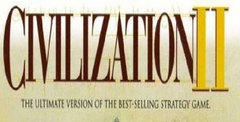
System requirements:
- PC compatible
- Operating systems: Windows 10/Windows 8/Windows 7/2000/Vista/WinXP

System requirements:
- PC compatible
- Operating systems: Windows 10/Windows 8/Windows 7/2000/Vista/WinXP
Game Reviews
Where Do You Want To Go today? Shall you direct the Mongol hordes to the gates of Rome, or will you lead mankind in its dream of colonising the distant stars? Either way you're going to get a headache and a bloody nose on the road. To help all of you blood-thirsty despots and enlightened saints, we've pulled together years of empire building and cunning tricks to help you connive and cheat your way right to the top.
Getting started
No matter how you intend to pursue your final goal, first you need to get your civilisation up. running and producing the essentials of life. In the early years it's a wise strategy to avoid producing soldiers and armaments, and concentrate instead in creating settlers who can build productive cities. Let your motto be "Go forth and multiply". While your settlers get on with all that baby making and ditch digging, use one simple warrior to scout as far and as fast as possible in the search for those huts which contain hidden goodies.
In most cases this action will gain you additional tribes who can move even further and faster to aid you in the quest for early advances.
Irrigate, build roads and establish trade routes between your own cities and those of your neighbours. Trading with other nations is rewarded with big bucks, and even if you go to war with your partner you'll find that your caravan trade continues. Apparently the game designers subscribe to the slogan. "War, Schmwar. Business is Business!".
Apart from a meagre handful of annoying small tribes, the computer-generated civilisations will tend to avoid direct confrontation with you in the early stages, so don't bother trying for an early strike on the guy next door as there'll be time enough for that later. If you find that your land mass has obvious links to other civilisations, then position and fortify your troops in this area to seal yourself in. Little local difficulties at home are usually just weak uprisings which can be dealt with by a few troops.
In the early years, you will flourish in a despotic society as people work hard and don't bother asking for CD players. However, do get yourself into a monarchy as soon as you possibly can to take advantage of the extra production which comes with regal rule.
Investing for the future
As in the real world money brings power, so by spreading your empire, setting up trade routes and thus filling your coffers with gold as early as you can, you'll find that options become easier later on. Should you realise that the opposition is about to develop or create something that you are also pursuing, remember that you can buy your way forward with cash quicker than they can develop it. With money you can put production on overtime to gain an early technological advance, and then use that to gain even more ground. Think of the extra production a factory can churn out in a few turns if you're able to get on-line early.
There is, however, an important 'feature' in the game which you must be aware of. If you buy an improvement before you even have one production shield in the kitty, then the cost is double the normal price. If for some reason you feel you simply must have an improvement by the end of the current turn, then here's a cunning wheeze: buy some cheaper improvement which you don't need (it will still cost double), and then before you are given the improvement, use the 'Change' button to nominate the improvement you really want and buy that instead. The smaller number of shields which you bought at the double rate will enable you to upgrade to your preferred improvement at a cheaper cost.
Wonders of the world
Building wonders is obviously very important and every player has their own favourite. Each individual wonder will have something going for it, but some are arguably better than others. As with all growing organisms, getting a good start in life tends to perpetuate itself into a strong body, and the Pyramids is the wonder which 'just keeps on giving'. With this wonder you will halve the time for citizen production, and your tribe's birth rate will just keep outpacing everyone else's.
If you decide that your best strategy is to keep your head down in the early years, emerging later when you have outstripped the others in science and technology, then The Great Wall is the wonder which will keep the marauding hordes from your door. Computer-controlled civilisations tend to avoid confrontation if The Great Wall bounds your cities, and again this will save you diverting funds away from research.
The Great Library is another wonder with its own circle of admirers, but interestingly it can be admired more for what it prevents others from doing than for what it actually gives to its owner. If you're trying to outstrip the competition by moving forward as quickly as possible, then you must prevent other players from getting their hands on your knowledge via their ownership of the Library. You might not need to learn others' secrets, but you damn well don't want them to have the power to steal yours!
War!
Napoleon's quote that "Armies march on their stomachs" sounds smarter than "Armies march on roads", but in this case it means the same thing. You need a good infrastructure to move supplies and armaments from the area of production to the battleground.
When you attack you must fall on the enemy like a thunderbolt and overwhelm him in a short space of time. Before taking a city be sure you can hold it. and subsequently use it to rest and rebuild your troops. If. however, your intelligence shows that the city is powerfully defended, then don't waste your troops by attacking the fortifications, simply position yourself in the surrounding fields and dig in. Once you have fortified yourself in his food-producing zones and started pillaging, all his supplies will cease and things will start turning nasty inside. With no food coming in, the citizenry will begin to die off and all other production will cease. Sit tight, and as time passes, natural progress will bring more and more deadly force to your aid.
Guerrillas in the mist
Guerrillas and partisans can be a real pain in the butt, but there is a cure for this annoying complaint. When a city containing partisans is taken, these troops will appear like weeds around your newly-won prize and bog you down for ages. Their Achilles heel is that they can only flourish in those empty land squares within a city's zone of control. You can either fill up those squares with your own troops before taking the city, or at least control which squares they do appear in and prepare some horrible surprise to await them.
Britannia rules the waves
Ruling the sea is just as important as ruling the land. Players are encouraged to build their capital cities with a sea view, as in theory this gives them access to all of the bounties that harbours and off-shore production can bring. Of course, this action will also ensure that you are able to bring a battle fleet up to their front door. A heavy naval barrage tends to knock ten bells out of a city's defences in double quick time. Ships move further than land forces in the early stages of the game, and should you decide to go for an early knockout on an opponent who snatched an important wonder and installed it in a beach house, then your turning up one morning with a couple of battleships could ruin his whole day.
Foreign policy
The first rule of survival is "Never give a sucker an even break". Let's face it, it's going to be interesting to see just how long the meek manage to keep the earth once they inherit it. Experience shows that only the weak benefit from long-term alliances. By all means make peace with the big guy next door, but only for as long as you have to. Powerful friends will endlessly ask for a lick of your lollipop, and while you must occasionally give in to this, you should resist it whenever possible. If you are forced to trade secrets, offer those which won't help the opposition build a wonder that you're already building.
Use your friendship to glean inside knowledge of your rival's position, and always be ready to strike at his weakest point. An overwhelming attack on his least defended outpost will almost certainly gain you important technology secrets, and you can always say sorry afterwards. The computer-controlled opposition is always ready to believe that you'll mend your ways and will offer you another chance when you want to kiss and make up. Again and again you can behave like a spoilt brat with a limp-wristed probation officer without suffering true retribution. Years later, when you are Master of the World, you may feel some remorse about the way you behaved, but at least you can console yourself by strolling down the bank to count your gold.
Home rule
Establishing a tolerant democracy for yourself holds lots of benefits such as increased production and less corruption, but it does cramp your style. It can be galling to manoeuvre an army across the globe and position it outside the opposition's front door, only to find that your own government prevents you from attacking. The answer here is to declare a revolution and take up your old despotism ways - after all, it's the winners who write the history books and they'll forgive and forget when you eventually bring home the bacon. Experienced players do, however, place great emphasis on gaining the innocuous sounding Woman's Suffrage development, as it's a big help in a democracy. Having this wonder enables the men to go off to war while the women continue to work in the factories without missing their home comforts.
Fundamentalism seems a silly thing to get into, but if you use it in the later stages when you have already made lots of scientific advances it can make for a powerful strategy. With this form of rule you can fight a very effective war against all the other governments and steal their technology. Fanatic armies aided by fast railways can overwhelm democracies because of the rate at which they can produce armaments. Once you have reduced the opposition to a manageable size, you can sell off your defensive structures and use the cash to dispense bread and circuses. This will cheer up the proletariat on your inevitable return to the democracy, and this is important because you'll need it to get into the space race.
Know your enemy
It is a truism that "Diplomacy is war carried on by other means". It's essential that you exchange diplomats with your opponents as this will enable you to examine the opposition's cities, find out how powerfully they are defended, and locate the sites of any wonders. You may be a peace-loving democracy, but should you decide that it's in your interest to take a big leap forward by acquiring a wonder without paying for it, then you'll want to know where to strike. You can also spot most of the big wonders by selecting the 'Top 5 Cities' option and seeing what's built there.
The trick is to nick
The second oldest profession is that of the Spy. Diplomats and Spies are two of the more powerful pieces on the board, and when used wisely they can save you stacks of time and money. When you consider how long it takes to acquire certain technology, it's obvious that it can be much more profitable to simply send in one of these unscrupulous characters to steal the work of others. Of course, there's a good chance that you'll suffer retribution, but if you're secure behind walls and cold steel it's usually worth the risk.
Be aware that it's as easy to lose knowledge as it is to gain it. One particularly sickening way for the stinger to get stung is by seizing an enemy city which you do not have the strength to retain. Should the enemy counter-attack and regain the city, you'll find that they will also grab a piece of your technology. A moment's greed on your part could be a costly mistake.
Railroads in the sky
The speed by which you can move goods and troops around the map can mean the difference between winning and losing. Continents tend to be awkward shapes bisected by frustrating blobs of water which slow everything down. However, there are two straight and uninterrupted strips of polar ice which straddle your world, and these are custom-made to take high-speed railway lines. It's a cunning strategy to construct a railway track around the polar strip with suitable junction points down into strategic continents. Place factory cities near the junctions and you will be able to construct and transport men and goods at high speed around the world. Make sure you construct your on/off ramps on the glacier squares so that your freight doesn't take a full turn just getting on and off.
Decision time
So how are you going to play it? Are you going to take your mother's advice and study, work hard, and get your reward in heaven? Or are you going to lie, cheat and steal so you can end up on the Queen's Birthday Honours List?
Heed the Troubleshooter's motto: "Go for it. For when you die, the bastard with the most money wins!"
It's slow-paced. It's devoid of any action. It's plain as far as graphics go. What is it? Only the finest turn-based strategy game ever to hit the PC (in this writer's humble opinion). Civilization II has won countless awards from the PC press and is generally considered one of the best computer games period, strategy or otherwise. Now, PlayStation owners will be treated to a console version that thankfully, isn't dummied down in the least bit.
Civ II is an empire-building game of epic proportions. You start in the year 4000 B.C. with a single group of settlers who are responsible for building your first city. Once this capital city is in place, you can choose what resources its inhabitants will work on, based on the surrounding environments (mountains are good for mining, oceans are good for fishing, grasslands are good for growing food, etc.). While keeping your populace happy and fed, you'll also have to worry about expanding your empire beyond that initial city, while keeping a strong military presence and making sure you're keeping up with the rest of the world in terms of scientific know-how.
This scientific know-how will prevent your empire from falling by the wayside in the game's ultimate goal: to either conquer all of civilized Earth or to be the first nation to colonize another planet. In the beginning, you will start with some basic knowledge to keep your primitive society alive, such as irrigation (to help grow food) or pottery (to help build granaries to store food).
In the end, you will have to take your civilization through more than 6,000 years of scientific advances, ranging from discovery of the wheel to bronze and iron working to reading and writing to gunpowder to steam power to gasoline combustion to solar and nuclear power. These discoveries will allow you to build special structures, including certain "Wonders of the World" like the Great Wall (of China) or something less grand, like a simple temple for people to worship at or a sewer system to help keep your cities clean or a SAM missile battery to keep the skies friendly. You will also learn to create military units ranging from the chain-mailed pikemen to musketeers to modern-day stealth bombers. Overall, you will be working with a knowledge tree of close to 90 branches of science, each allowing you access to a multitude of different structures and units. Like we said: epic. You can play Civilization II any number of ways.
You can expand quietly, making peace with the other CPU-controlled civilizations, or you can overrun them with brute force. Just make sure you don't fall too far behind in the scientific race. After all, archers don't fare too well nowadays against AEGIS Cruisers.
Civilization II will not sell as well in the action-oriented console market as it did on the PC side, but that doesn't mean it's not a game worth checking out. If you're the patient, thinking type and you're into strategy games, you owe it to yourself to check out this masterpiece.
People say:
8 p.m.: I boot up the PS version of my all-time favorite PC game. 8:01 p.m.: Besides not getting to pick a map (no real worlds here, only randomly generated ones), I find out the rest of the options are in. Even the kick-ass music is intact. It's looking good so far. 9 p.m.: My society has now learned how to write and make basic bronze weapons...time to rock. But where's the little box that shows how close you are to completing a unit or building? What a silly little oversight by the developers. And what's up with the instant advice? It isn't very helpful. Why is it telling me I should build a temple to make my people content, when they are already content? 11 p.m.: I'm getting further in the game. All the marvelous and epic gameplay from the PC title is obviously intact (but if you own the PC version, you have zero reason to get this one...it's the exact same game, only without the mouse controls). I've discovered gunpowder and my musketeers are making their way toward my enemies to the south. Awesome. 4:30 a.m.: I'm getting tired, but I need to keep sending my stealth bombers out on strafing runs. Unfortunately, the Al "thinking" times are getting really long. 8 a.m.: Uh-oh. I have to go to work. But I haven't slept or showered... Ah, maybe I'll take a sick day and go to sleep now. Sure, just after a few more turns...
This is the perfect evangelist product for this kind of game on consoles. Civ II is revered on the PC for many good reasons, and this port to the PS is pretty much perfect. It may not have much superficial glitz or eye-candy, but the gameplay is absorbing and addictive and probably has more longevity than any other game on the system. If you've ever wanted to get into more cerebral strategy gaming, try this. You'll lose days of your life.
Don't be intimidated by the sizable manual, the detailed charts and the words "strategy game." This is one title most of you won't want to miss. Civ II is grand: You start out in ancient, primitive times with nothing and advance through the ages until you've learned space flight. Taking a nation through the paces of civilized history is something you just can't do in your average video game. Patient gamers should check it out.
I'm totally exhausted. I've played Civilization II every day for this past month and I still get amazed by the inner complexities of the societies created. I was a moderate fan of the first game, but the attention to the computer's Al is so much better now. Your actions have deep impact over the cultures you encounter. It should be said you'll need to invest a lot of time into this game, but your patience will be rewarded. Excellent.
Civilization II took strategy gaming by storm earlier this year, and now MicroProse is back with an add-on disc jammed with intriguing new scenarios. The original Civ II challenged gamers to take on the role ot the ruler of an empire, managing its politics, sciences, and social structure with the ultimate goal of taking over the world. Civ II Scenarios loads you up with 20 new plots, including the Iranian hostage crisis, the American Civil War, a futuristic holocaust and alien invasion, and the rampages of Alexander the Great and Napoleon.
Overview
Activision has converted the award-winning PC game to the PlayStation platform. Most people are very familiar with the setting -- you’re the ruler of a young civilization struggling to survive and grow from 4000 BC to the space age 2020 AD. Most of us have devoted hours sitting in front of the PC trying to build up our empire and enticing our subjects to give us a better throne room. But those days were dealt a death blow years ago by real-time strategy games like Warcraft, Starcraft and Age of Empires.
Gameplay
Don’t bother playing unless you have a LOT of time on your hands. After the cities have grown to a reasonable size, it takes what seems like forever for the computer to complete its moves. I recommend having a book handy so that you can finish a chapter or two before it becomes your turn again.
I found the graphical interface extremely clunky. Once a unit was selected, the only way I could get it unselected so that I could move to other areas was to bring up the map view and then dismiss it. It would have been nice if the game didn't make you perform two operations for something that should only take one. The PlayStation paddle comes equipped with enough buttons that this should be uncalled for. The game also seems to screech with glee each time it thwarts your attempts to move around and view the layout of the enemy cities and troops. Eventually I got so tired of trying to scope out the area that I just moved my troops in the general direction of where I thought I remembered seeing the enemy.
I’ve been a little rough on the game so far. I bet you’re asking, "Isn’t there ANYTHING about the game you liked?" Sure there is. The reason Civilization II on the PC became the number one selling game in history was because of the rich choices of civilizations, troops and strategy you have at your fingertips. Starting a new game takes a while, but it’s because you have a myriad number of choices that can make each game unique and up to par with your empire-building skills. The game tests your ability to manage numerous troops.
Civilization II does take a whopping 10 blocks of memory per game, which I suppose can be attributed to all the statistics it has to hold. So don’t be disappointed if you move your civilization along at a nice clip and decide it’s time to go to work or school, only to discover that you don’t have enough blocks free on your card.
Graphics
I have a pretty large TV, or at least it felt that way when my brother and I carried it in. But I obviously should have invested in a movie theatre-sized screen if I wanted to play this game. The text is so small that you’ll find yourself pressing your face against the screen with a magnifying glass, trying to decipher what it says. The units are so small that you’ll often select the wrong soldiers or wonder what kind of unit you have under your pointer.
Bottom Line
Unless you’re a die-hard Civilization fan and proudly display it as your Windows desktop theme, don’t bother buying this game. The graphics are too small, the user interface is clunky, and Activision missed a golden opportunity to take the best-selling game of all time to the next level.
Overview
Well, ladies and gentlemen, it took a while, but Civilization II is finally out. And yes, most of the neat little improvements, bells, and whistles that were promised are in the final version. However, that may not be as many as you are expecting. While Civ II is indeed a wonderful game, it is important that it be presented as simply the next generation of Civilization, not a radically new product. Microprose has presented it as such, and to coin a phrase, if you liked the original you will love the sequel.
Oh, what's Civilization, you ask? In case you have been in solitary confinement or were raised by wolves, Civ is quite possibly the best game of its genre of all time. In it, you are in charge of the management of a civilization (hence the name), deciding how to expand, develop and progress. It involves city management, military planning, scientific research, negotiation, strategy and everything that trigger-happy Doom/Quake meisters like myself usually shy away from. At first thought, it sounds kind of like history homework. However, if you give it a chance, it really grows on you (as millions of Civ addicts undoubtedly know.) In fact, I was amazed at the number of sleepless nights I spent trying to develop gunpowder or secure the Arabian peninsula. In fact, I don't remember ever telling myself "just five more minutes ..." so many times in a row.
Gameplay
This is where Civ II really delivers. If you are the type who played SimCity (or any of its variants) throughout the night in order to recover from the recent (un)natural disaster or implement your new anti-crime/traffic/fire plan, you'd better be sure your calendar is open before getting this game. While there may be flaws in its execution, in general buying Civ II for a Civ or SimCity junkie is like passing bootleg around at the local AA meeting. It is quite addictive. Again, this depends on the type of game you like. If you prefer a warm shotgun over an Aegis cruiser or would rather study the finer points of using the BFG than negotiate with Mongol tribes, this game may not be for you. But then again, it just might.
If you have at least a passive interest in simulation, development, strategy, history or the like, I recommend this game. Not only does it give you a varying level of detail through auto-implementation options and difficulty levels, it also leads to a variety of strategies. For instance, do you give tribute to the cocky English in order to secure a peace treaty, or do you instead build better defenses and armies to take back what is rightfully yours? Even if you do opt for the treaty, do you break it in order to secure a financial gain or will you keep your word in order to keep a clean reputation with other countries?
Microprose added a certain level of detail and realism to negotiation and other areas that were somewhat neglected in the original game. One of the first things I noticed was that when I played as a vicious warlord, taking land and breaking promises, other civilizations soon learned that I was not to be trusted and treated me with disdain. I guess that was what I was looking for in the first place. If I can play against the computer and treat it like a little kid without getting my fanny whacked for it, I'd rather be deathmatching. Civ II plays well in this sense, providing a wide enough variety of challenges and responses that you won't fall asleep at the wheel -- or at least if you do, you can expect to pay for your mistake in spades.
In short, I think that Civ II combines the strong points of the original Civ with some wonderful improvements in gameplay, making for a comfortable yet refreshing game. The game is fun to play and is not too complicated, especially if you have played Civilization before. In order to help you acclimate to the changes, the manual carries a good deal of information directed specifically to players of Civilization. If the Civilization II network patch comes out as promised, I am going to be very glad to have gotten this game. If not, I'll still like it a lot.
Installation/Setup
Although I did not do extensive testing (a couple of installs, maybe), I found the installation process to be easy and trouble-free. It did not take too long before I was getting my fanny conquered by everyone from Aztecs to Zulus. The degree to which you may have problems will vary between systems, but I found the setup to be straightforward and smooth. In addition, the in-game customization and setup was very convenient; whenever I thought, "I wish I could change that ..." I usually could, thanks to the in-game help.
Graphics/Audio
While this is by no means a multimedia tour de force, I must admit that Civ II is a nice step up from both the original game and other titles in the same vein. Not only do the SVGA graphics add a great deal of fun and ease of use to the game, but also multimedia clips, good unit sounds, and neat abstract graphical details add a lot to an already very playable game. Units are all detailed and colorful enough to distinguish without any problems, and battles are often fun because of the accompanying sounds, such as roaring elephants and roughriders charging with bugles trumpeting. In addition, I always looked forward to new technologies because they meant that I could see a video of my latest development. Even if those get annoying, you can turn those down or off.
While the graphics are not necessarily a breakthrough, I think that the audio and video included should set a standard for future games. After all, if you have a whole CD, you might as well fill it with something. One thing that all users may not like is the music. While it is not bad, it is simple MIDI files that are not the richest you have heard, to say the least. However, Microprose gives you the option of specifying which music you want (or don't want) to hear, or you can just shut it off. All in all, the multimedia aspect of the game is relatively good, especially for a "thinker" kind of game.
So What's New?
Since Civ II is about 85% Civ and 15% new stuff, I'll focus on the differences between the two. There are quite a few, so I'll try to cover the most important ones. If you have played Civilization, imagine Civ II as a remodeled version with the same chassis, but a new engine and a beautiful paint job. First of all, the game is in SVGA, a dramatic improvement over the original. In addition, the map view has changed from a square view to the ever-popular isometric view. Therefore, you now look at terrain from a diagonal angle. In order to distinguish individual squares on the map (one of my personal frustrations with the original), the game includes an option that lets you overlay a map grid upon the terrain, thus showing divisions in territory and allowing you to plan cities and prevent overlapping.
Also worthy of mention are the changes in the combat engine. Military units are now more detailed, including defense and firepower strengths, as well as a varying "health" that varies between the two states of "dead" and "living" that existed in the first game. Therefore, if you get in a fight, your unit may win the battle, but be damaged or injured in the conflict. As a result, you need to either rest the unit (preferably in a town) to recover, or walk it around damaged and take the risk of it getting killed more easily. In addition, there are greater numbers of units to choose from, giving you more of a varied army.
In addition, the areas of diplomacy, research, and management have been improved greatly. There are more technologies, technological dead-ends have been removed, terrain and cities are more detailed and specific, and diplomacy is more realistic. I was impressed that finally, other civilizations get pretty miffed if you keep breaking treaties. If you are a tyrant, they will notice and be careful with you, often refusing even to consider a treaty or other such agreement. In addition, the Wonders have now been given little video/audio clips that present and celebrate such achievements, adding a feeling of polish to the game.
Documentation
Since this is something that has been very lacking in games as of late, I think it is important to let game companies know that we still want a manual. Fortunately, Microprose headed us off at the pass with Civ II. Not only do you get a hefty (i.e. specific, but not quite a tome) manual, but also a large poster giving development trees and strengths of various military units. This made it very easy to get into the groove of the game, and I think that would be true for both the new player and the very experienced Civ ver. If I could, I would give a round of applause for coming through in this area. Since the game is so complicated, online help (pretty good in this case, I must admit) just doesn't always cut it. Three cheers for good manuals!
Computer AI
While the computer may act like a bonehead at times, I found that in general the AI was satisfactory at its worst and frustrating at its best. While there are occasional loopholes and tricks that you can pull on the computer, I found that in general it is much smarter than the enemy in the original game. In addition, it can be really angering with the new reputation that you carry in negotiations, because once you are in a treaty or pact that you want to break (but can't), you have to convince him to withdraw from the agreement without breaking it yourself.
In addition, one of the factors that I learned to like was the entrenchment factor. As technology advances, wars get more and more expensive. In other words, what would be a fairly manageable war in the early game would be prohibitively expensive in the later game, when defensive technologies are more advanced and cities are well-fortified. This pushes the character more towards negotiation than war, although both paths are equally viable in many situations. In the long run, the peaceful path leads to a space race, where the warlord attitude leads to a war of annihilation for one side (or both).
In addition, there is a good variety in difficulty settings, and at the highest level (Deity), it is very challenging (at least for a mere mortal like me). I just wish I could wade in with my BFG and chaingun at times. Therefore, even when you get good at the game there is a great deal of playability at higher levels, where challenges increase and the computer babies you less and less.
Reviewed On
P-133, 16 MB RAM, 64-bit video card
Bottom Line
While those looking for a revolutionary new game may not be entirely satisfied, any serious gamer who can even imagine enjoying this game probably will. While Microprose did not build an entirely new beast with this game, I feel that they kept the best of the original and changed weaker points in regards to user input. If you find yourself still playing Civilization every once in a while, or even if you want to, get this game. It may not be perfect, but it's pretty darn good. In fact, if this were an original release (not a sequel), I think it would be given immediate enshrinement. It's a great game, and I give it a 94. It could be a little better, but I'm so busy looking at the things I like that it's hard to remember the things I don't. If only the Civ II Net Pack is a patch and not an entirely separate product, I'll be in heaven. And if I do hear that nasty Cyberdemon calling again, there's always the Aegis cruiser ...
Snapshots and Media
Playstation Screenshots
See Also
 Cities: Skylines
Cities: Skylines
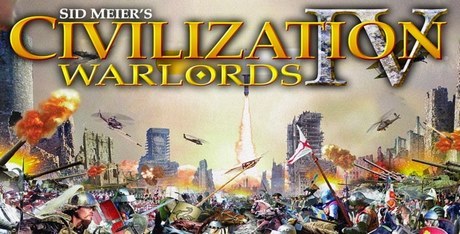 Sid Meier's Civilization IV: Warlords
Sid Meier's Civilization IV: Warlords Civilization: Call to Power
Civilization: Call to Power
 Robert E. Lee, Civil War General
Robert E. Lee, Civil War General
 Command & Conquer: Red Alert
Command & Conquer: Red Alert
 Command & Conquer Red Alert Retaliation
Command & Conquer Red Alert Retaliation
 Command & Conquer
Command & Conquer
 Red Alert 2: Yuri's Revenge
Red Alert 2: Yuri's Revenge Command & Conquer: Red Alert The Aftermath
Command & Conquer: Red Alert The Aftermath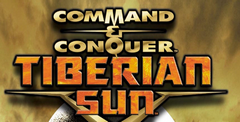 Command & Conquer: Tiberian Sun
Command & Conquer: Tiberian Sun
